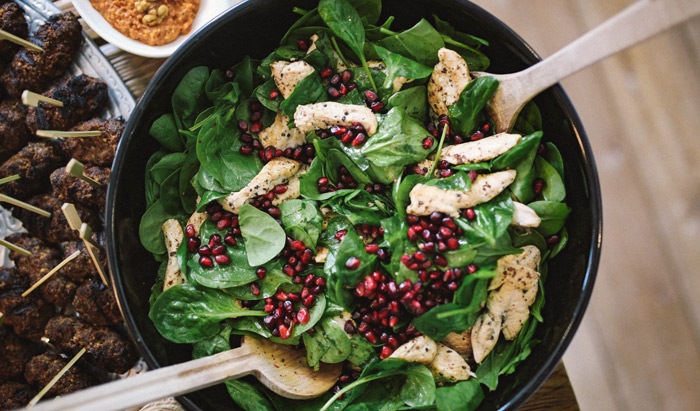If you have high cholesterol, chances are you won’t feel any different than usual.
It’s a silent killer—you could have it and never know.

The reality is, high cholesterol easily takes that title of the “silent killer.” It progresses without obvious signs or symptoms to indicate its damaging presence in your body.
It can linger along for a long time before revealing itself, often sneaking up unnoticed until it has taken a toll on your health — at which point it may be too late.
Clearly, this sneaky villain deserves more attention than it currently gets. High cholesterol — specifically LDL (low-density lipoprotein) cholesterol — is an issue that affects far too many people.
The best way to check if you have high cholesterol is by having your doctor do a blood test. This results in more accurate readings of your cholesterol level as opposed to a guessing or even adopting new lifestyle choices (like switching to a low fat diet).
What is High Cholesterol?
High cholesterol is something you’d catch if it were contagious (it’s so prolific), but it’s something you need to look out for yourself.
Put simply, it’s when your body produces too much fat and it gets stuck in the walls of your arteries.
Over time, this can result in a buildup of these fats which can narrow the arteries so not enough oxygen-rich blood gets through — putting you at higher risk of a heart attack or stroke.
It’s just another reminder of why eating well and exercising regularly really counts – taking care of our bodies will hopefully pay off when faced with the consequences later down the line.
While it can be caused by genetics or certain medications, most cases of high cholesterol are a result of excess and deficiency combined with stress. But don’t worry!…
There are 2 simple steps you can take for healthy levels naturally
But first, let’s look at how excess, deficiency, and stress play a role in high cholesterol levels and what you can do to keep your levels in the healthy range.
How Excess Contributes to High Cholesterol
The excess consumption of unhealthy foods is one of the main contributors to high cholesterol levels.
Foods that are particularly bad for your health include:
- processed junk food (such as chips, crackers, French fries, donuts, etc.)
- foods that are loaded with saturated fats (like red meats and cheeses)
- foods that are rich in trans fats should also be avoided (these increase LDL (bad) cholesterol levels while simultaneously lowering HDL (good) cholesterol levels)
- eating too much sugar (also contributes to elevated LDL levels)
How Deficiency Can Cause High Cholesterol
On the other hand, when deficiency is in the equation and your diet lacks certain essential nutrients like omega-3 fatty acids and dietary fiber, this too can lead to higher LDL levels.
Your body requires:
- Omega-3 fatty acids help to reduce inflammation in the body which is known to contribute to heart disease
- Dietary fiber to help remove excess LDL from the bloodstream before it can cause further damage
A lack of either nutrient increases your risk for developing high LDL levels which puts you at greater risk for heart disease.
While it’s best to get your fiber from foods, like fruits, vegetables and legumes, supplementation is a great way to make sure you are giving your body enough. [Recommended Supplement]
Tip → Simple Foods High In Omega-3’s
To get the most out of life, we have to make fresh choices about our diet. When it comes to Omega-3 fatty acids, making those fresh choices is a little easier because nature has provided an array of nourishing options from across land and sea!
The great thing about Omega-3 is that you don’t have to go on a special seafood menu; there are plenty of land-based sources like walnuts, chia seeds, and flaxseeds.
If your goal is to get as much as possible in one sitting, then flaky wild salmon or sardines are your best bet.
Adding hemp hearts or herring to a salad for dinner can really give you a good boost.
Remember, with quality foods like these—healthy doses of Omega-3 fatty acids can be part of regular meals without much fuss!

Source: PepperStuckintooth.com
Tip → Tasty Foods High In Fiber
If you’re looking for tasty, healthy foods that are also high in fiber, the possibilities go far beyond just boring bran muffins. In fact, you could think of it as an adventure to sniff out the best recipes with the most fiber!
Hummus is a popular favorite and can easily be used as a dip or spread. Not only is it rich in fiber, but it’s made with delicious ingredients like garlic, lemon juice, and various spices.
Other great options that deliver an unfairly good dose of fiber are navy beans (toss them with fresh veggies for a salad), blackberries (pairing them with freshly whipped cream makes a terrific light dessert), and oats (a fantastic cereal or snack).
No matter what your taste buds are craving, there’s certainly a nutritious option that’s loaded with the good stuff!

Source: PepperStuckintooth.com
Stress is Also a Curse Cause
Stress is another big factor that contributes to elevated cholesterol levels. This is due to its impact on hormones, such as cortisol, which have been linked with an increase in bad cholesterol.
This means that chronic stress — or prolonged periods of intense stress — can lead to higher LDL levels over time. Thus, it’s important to find ways to manage stress effectively. You can implement yoga, or meditation, into your life. Or even simply taking a break from work every now and then would help!
Throughout your day, get up, move, walk, stretch…
It’s a fact! According to medical experts, a lack of physical activity can also play a major role in high cholesterol.
When you don’t engage in physical exercise regularly, your body doesn’t use as much ‘bad’ cholesterol, potentially leading to it accumulating and increasing your risk of heart disease.
That said, not all physical activity needs to be overly strenuous; something as simple as taking a 15-minute walk after lunch could help you go a long way towards maintaining healthy levels!
High cholesterol isn’t something anyone wants, but it’s something we all need to pay attention to if we want our hearts healthy for years come!
By understanding how excess consumption of unhealthy food, combined with deficiencies in essential nutrients, plus added stress can cause elevated LDL levels we now know what steps we need take towards having healthier lives.
But Wait… What About Medication?
I’m not saying they are bad, but…
Medications designed to reduce high cholesterol levels can cause a whole host of side effects that range from minor, like an upset stomach or headache, to more concerning ones such as swelling of the face, limbs and throat.
These medications can also mess with your sleep cycle, causing insomnia, and in some cases may even lead to sudden mood swings.
Often these issues are transitory, and may pass once the body adjusts to the medication. The key is to get regular blood tests and report any unusual symptoms you’re experiencing.
However, if you’re anything like me, most medications cause more severe side effects, more often. This is why, under medical supervision, of course, I choose natural methods of healing.
What Works So Much Better Than Meds…?
When it comes to high cholesterol, tackling the root causes can be more effective than trying to combat its effects with medications.
After all, you don’t undo a broken refrigerator by plugging in a fan – so why would you expect to cure your cholesterol woes with medication alone?
Eating healthier and exercising more is an excellent start, but avoiding foods that cause high cholesterol is another key step towards keeping that number under control and improving your overall health.
Reducing the bad things and increasing good not only helps maintain healthy cholesterol levels, but it also may lower blood pressure and reduce the risk of stroke too!
So before reaching for the prescription bottle, take a few moments to think about what goes on your plate – it might be just as effective (and tastier) than popping a pill!
Just 2 Steps to Healthy Cholesterol Levels Naturally!
- eat better quality food while ensuring our diets have enough omega-3 fatty acids and dietary fiber
- manage stress effectively to lower our risk of developing high LDL cholesterols significantly
So start making changes today towards a healthier tomorrow!
AND…
Don’t leave it up to chance! Make sure to get regular physicals with your health provider.
